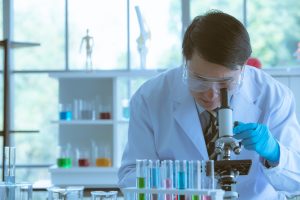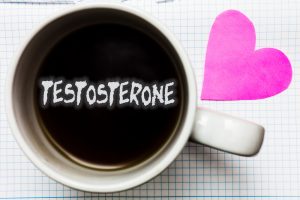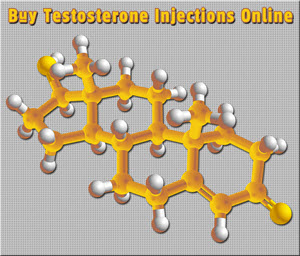Video Link: https://vimeo.com/293539292
Video Download: Click Here To Download Video
Video Stream: Click Here To Stream Video
Research regarding the effects of Testosterone Deficiency and Testosterone Treatment for men with Low-T has ballooned in recent years, as the number of male patients that have sought out Testosterone Treatments such as Testosterone Injections and Patches has grown into the millions.
There have been questions about Testosterone about its safety, however. For one, there has been some evidence that suggests that Testosterone Replacement  Therapy increases the risk of Prostate Cancer and other Reproductive Cancers. Based on new research published by The Journal of Urology, however, the risk of Prostate Cancer that has been previously associated with Testosterone Therapy is overstated, and may not increase the risk of the form of cancer at all.
Therapy increases the risk of Prostate Cancer and other Reproductive Cancers. Based on new research published by The Journal of Urology, however, the risk of Prostate Cancer that has been previously associated with Testosterone Therapy is overstated, and may not increase the risk of the form of cancer at all.
What is Hypogonadism, and How is Low-T Therapy Used to Treat Hypogonadism?
Hypogonadism refers to any health issue that leads to reduced levels of Testosterone. Many men suffer from Primary Hypogonadism, a class of conditions in which the testes are not able to produce Testosterone to meet the needs of the body sufficiently.
Most men that experience Testosterone Deficiency, however, suffer from Secondary Hypogonadism, a class of conditions in which issues upstream, related to the production of precursor hormones such as Luteinizing Hormone and Follicle-Stimulating Hormone, prevent the testes from doing their job and meeting the Testosterone needs of the patient.
Testosterone Therapy treats both Primary and Secondary Hypogonadism by restoring normal levels of Testosterone to the patient through the use of Low-T Patches, Creams, Gels, or other forms of Testosterone Treatment.
Testosterone and the Risk of Prostate Cancer
There has been no substantial evidence in the scientific literature that shows that Testosterone Treatment increases the risk of Prostate Cancer. Still, one major issue is that the body of evidence had not been sufficiently examined, nor had there been enough long-term Low-T Treatment research conducted to rule out the potential threat, until perhaps now.
In this Journal of Urology study, researchers examined three large-scale, long-term studies analyzing the effects of Testosterone Treatment on Hypogonadal Males. All of these studies are still being conducted, and, in total, they have a pool of more than one thousand patients.
By digging deep into the statistics of these three studies, researchers found no evidence that these men had an increased risk of Prostate Cancer than other men that did not use Testosterone.
Why do Doctors Think Testosterone May Cause Prostate Cancer?
Of course, all of this begs the question: Why is it assumed that Testosterone and Prostate Cancer are linked if there has never been strong evidence to point to that conclusion?
The primary researcher in this analysis, a Urologist from Germany named Dr. Ahmad Haider, explains that there has long been a bias among those in the medical profession, especially those not specially trained in urology and/or  hormone care, that Prostate Cancer risk is associated with Testosterone Levels in the body. Despite this evidence, the myth of this risk has propagated, mainly through clinical and medical training, to ensure that all risks are considered when using a treatment.
hormone care, that Prostate Cancer risk is associated with Testosterone Levels in the body. Despite this evidence, the myth of this risk has propagated, mainly through clinical and medical training, to ensure that all risks are considered when using a treatment.
Of course, in this case, the risk of Prostate Cancer from Low-T Treatment is a construct of the medical profession and its rigorous safety regimens, rather than from real evidence.
Many in the Medical Profession Still Believe that Prostate Cancer is Related to Testosterone Treatment
Once these ideas enter the medical discourse, they are incredibly difficult to dispel, especially in relatively new areas of medical treatment, such as Bio-Identical Testosterone Therapy.
In order for Testosterone to be considered free from these risks, there must be sufficient studies of both length and size which provide persuasive evidence to suspend the myth, which is why Dr. Haider and his associates felt it so necessary to conduct this study — a point has been reached in which men have been receiving Low-T Therapy in sufficient numbers, and under clinical monitoring, that we can begin to make declarations on the long-term safety of Hypogonadism Treatment with Testosterone for Men.
Dr. Haider believes that this study provides the necessary evidence to free Testosterone Therapy from the stigma of Prostate Cancer, and the evidence also shows that men that have experienced Prostate Cancer in the past, but have recovered from Prostate Cancer, can take Testosterone Treatments safely as well.
Testosterone-Prostate Cancer Analysis and Results
Dr. Haider's study involved a pool of 1,023 men taking Testosterone Replacement for Low-T and Hypogonadism. Patients were tracked for an average of around five years, and patients were tracked for as long as seventeen years.
The 1,023 male patients each belonged to one of three groups that were being analyzed together. One group of patients was first followed beginning in 1996  and received Testosterone from an academic medical center specializing in the field of Andrology. Four hundred twenty-two patients belonged to this group. The other two groups both began treatment as of 2004 at the earliest, and these groups involved 340 and 261 patients provided Low-T Therapy by board-certified urologists.
and received Testosterone from an academic medical center specializing in the field of Andrology. Four hundred twenty-two patients belonged to this group. The other two groups both began treatment as of 2004 at the earliest, and these groups involved 340 and 261 patients provided Low-T Therapy by board-certified urologists.
As with all studies of this kind, it is necessary to establish rules for what qualifies as “Low-T” as there is some debate in the literature. In this study, patients are considered Testosterone Deficient if they show clinical signs of Low-T (such as weight gain, loss of muscle mass, depression, fatigue, and erectile dysfunction), while also revealing Testosterone Levels below 12 nanomolar per liter. Finally, potential patients were screened for contraindications and allowed to use Testosterone for Men if they qualified.
All in all, eleven patients in total experienced Prostate Cancer through the course of their evaluation and use of Testosterone. In the two groups that received treatment from a urologist, five experienced Prostate Cancer in one group, and six in the other. In the Testosterone Lab Study, no patients experienced Prostate Cancer.
How Do These Prostate Cancer Levels Compare to the General Population?
Based upon the reference, there are different values for the number of patients that experience Prostate Cancer. Based upon the European Randomized Study of Screening for Prostate Cancer, 96.6 cases per 10,000 years of patient analysis, and in the Prostate, Lung, Colorectal, and Ovarian Cancer Screening Trial, the number was 116.
This means that the odds of experiencing Prostate Cancer among those analyzed in this study appeared to be lower than those in the general population. In the second group, the risk was 30.7 out of 10,000, and in the third group, the risk was 54.4 out of 10,000.
Of course, the safety of Testosterone Therapy is predicated on its safe use. Men that abuse Testosterone or otherwise do not use Testosterone Treatments as directed will not experience the same Testosterone Safety Profile, but, for men that take Testosterone for Low-T as directed, there is no sign that Testosterone Replacement leads to increased risk of Prostate Cancer, and all signs still indicate that it can be used safely as directed.
Increased Knowledge of Testosterone's Safety Improves Its Ability to be Prescribed Thoughtfully
It is clear that Testosterone Optimization, as well as other forms of Hormone  Replacement Therapy, will help to revolutionize the way that we treat aging patients, enhancing their care and allowing them to live longer fuller lives.
Replacement Therapy, will help to revolutionize the way that we treat aging patients, enhancing their care and allowing them to live longer fuller lives.
The future of Testosterone Therapy involves fully delineating the potential risks and drawbacks so that everyone that can benefit from Testosterone HRT Treatment can receive it while protecting patients for which the treatment could do more harm than good.
Contact Us Today For A Free Consultation

- Testosterone Replacement Beneficial for Modern Men? [Last Updated On: March 16th, 2025] [Originally Added On: February 11th, 2020]
- Statins Have a Negative Effect Upon Testosterone Levels [Last Updated On: July 10th, 2024] [Originally Added On: July 8th, 2020]
- LPCN 1021 Oral Testosterone Therapy Currently in Stage Three FDA Clinical Trial [Last Updated On: March 3rd, 2024] [Originally Added On: July 14th, 2020]
- Ten Ways to Manage Cholesterol and Testosterone Levels [Last Updated On: May 30th, 2024] [Originally Added On: July 16th, 2020]
- Testosterone Treatment Clinic for Men: Your Source for Affordable Testosterone Prescriptions and Treatment [Last Updated On: March 13th, 2024] [Originally Added On: August 2nd, 2020]
Word Count: 1222




















